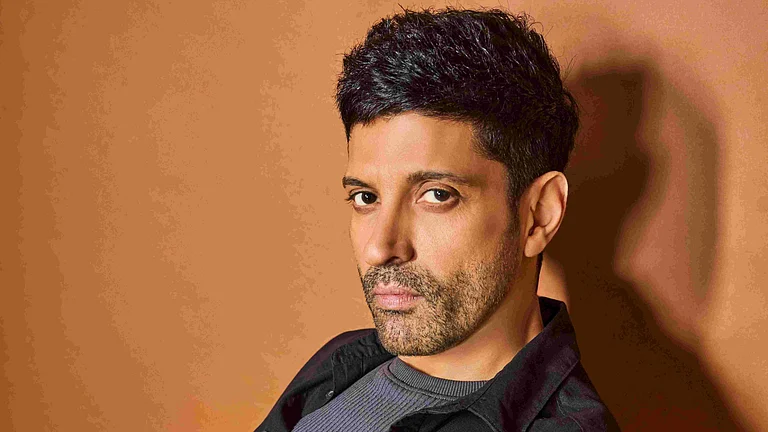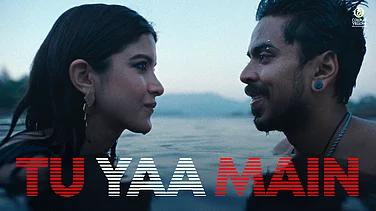Prithvi Gandharv is a star in the Indian Music industry! A singer par excellence, his playback singing career is soaring after his song in the super hit movie “Bajirao Mastani”. His song “ Albela Sajan” got the Best Raag-based song of the decade award at the Radio Mirchi awards. His Bollywood debut was the song “Boyega’ from the critically acclaimed film “Myoho”. He is loved for his Ghazals and Sufi music . He has performed almost at all the prestigious ghazal Festivals in the world, His latest original “Woh dekhna bhi, Jogi de naal, niyat e Shauq “are appreciated and celebrated by his fans around the world.
Prithvi has performed over 1000 concerts around the world accompanied by his own band. He has also had the honour of performing and touring alongside singing diva Shreya Ghoshal in over 100 concerts in India and internationally. He has also performed with Richa Sharma and the internationally renowned Music legend Ustad Zakir Hussain as well as Sivamani, Ranjot Barot andthe late Ustad Sultan Khan Sahab.
In an interview with Outlook, the musician talks about having a family lineage in music, the rich history of gazal and Pakistani singers
Excerpts from the interview:
Q. With a family lineage in music, what intrigued you to follow the music to express your thoughts? Why particularly Ghazal and Sufi music?
Ans: Being born into a family of musicians, the basic knowledge and understanding came to me effortlessly. Being passed on from generations before, without having to learn it, I happened to be a musician. Between the 70s to late 90s, ghazal, as a genre was quite dominant. It was that time when I got introduced to all the ghazal and sufi legends since my early childhood days.
The key reason that inched me closer to the genre is understanding how it acts as a bridge between pure classical and popular music. It is the way I can express myself as a singer through ghazals, the kind of freedom that no genre gives me to express deep and heartfelt emotions.
Q. What have been the challenges while understanding the rich history of Ghazal and sufi music and connecting with the same to bring out exemplary creations? How did you turn those challenges into opportunities?
Ans: Ghazal is the love of my life since childhood. The more time I spent with it, the deeper I started understanding the different dimensions of this vast subject. Technically, the singing style in ghazals is different from the other genres like folk, film song, thumri or even pure classical music. The challenge that I faced mainly was to keep the purity of the subject musically as well as poetically in a country where music is dominated by the film industry. By the time I grew up learning this genre, the film industry was going through a lot of changes musically. Songs like baraana de or aflaatoon, chalti hai kya nau se baara, etc., were making waves and it was very easy to get influenced and attracted to the popular stream. I am grateful to my family for keeping me rooted musically.
Q. You have been touring internationally lately to spread the love of Ghazal music. Which are the upcoming destinations? Why do you feel there’s a need to echo Ghazal’s richness to a global audience?
Ans: I have just returned from the 6-city dream tour called “Heritage” with the one and only legend across the borders - Ustad Ghulam Ali Saheb. Representing my country in Australia and New Zealand (where people from both countries live together) in bringing love and harmony through our music felt very surreal. The love that I received from both countries was overwhelming. I want to keep spreading ghazals, not just as an art form but as an emotion across the globe. The upcoming destinations for my tour are Europe, the USA and Africa.
Q. Having performed alongside music legends within India and from across other countries, what have been the key learnings that you cherish?
Ans: Music has no boundaries is what I have learnt. Also, this genre of music, i.e. ghazal and sufi, cannot be practised with just passion or as a hobby. You have to give your life to it and this one lifetime feels less. It is a hopeless love affair and being unconditional towards it is the only way to be with it.
Q. The traditional music industry is slowly seen waning among the new-age audience. Apart from performing at concerts, are you thinking of developing new talents to continue spreading the ghazal and sufi music supremacy?
Ans: I feel it is not waning away, but it was always there and now it is returning to its celebrated glory all the more. Ghazals have always been a genre of a niche audience, so we cannot expect millions and billions of views that we are going crazy for. Let it be exclusive. Diamonds are always expensive and exclusive!
Q. Several Pakistani singers have come to the limelight with them singing age-old Indian songs. How do you see the association between Indian and Pakistani music can further the influence globally?
Ans: The exchange of music has always been there. No war can take this away. Wars are temporary, love is the ultimate truth which is permanent. India has always been a country with a big and warm heart when it comes to welcoming celebrated artists from other countries including Pakistan. I don’t see any issues regarding this. Also, people who complain that they don’t get enough opportunities to showcase across the borders must focus on honing their skills to make it truly big.


























